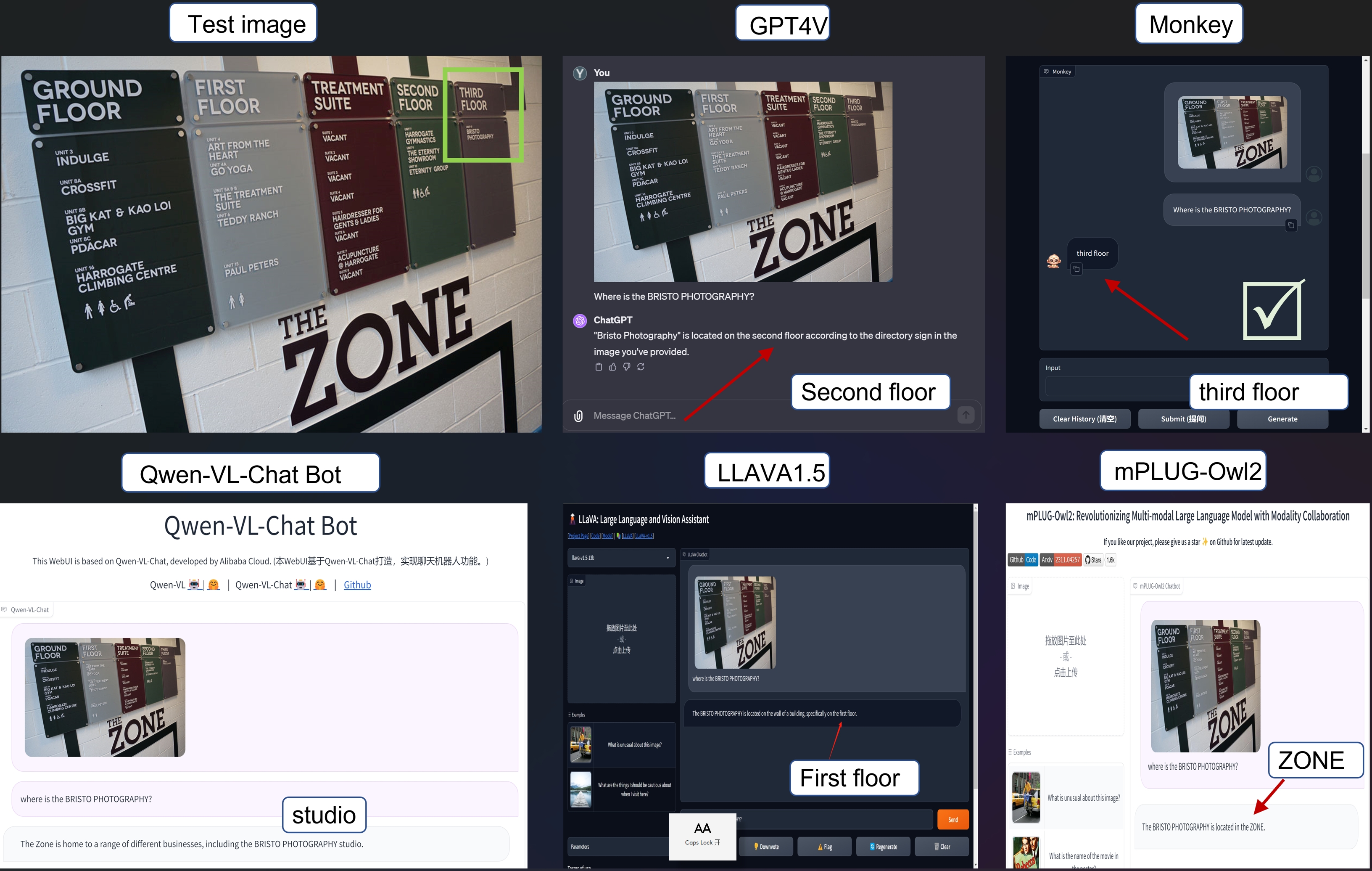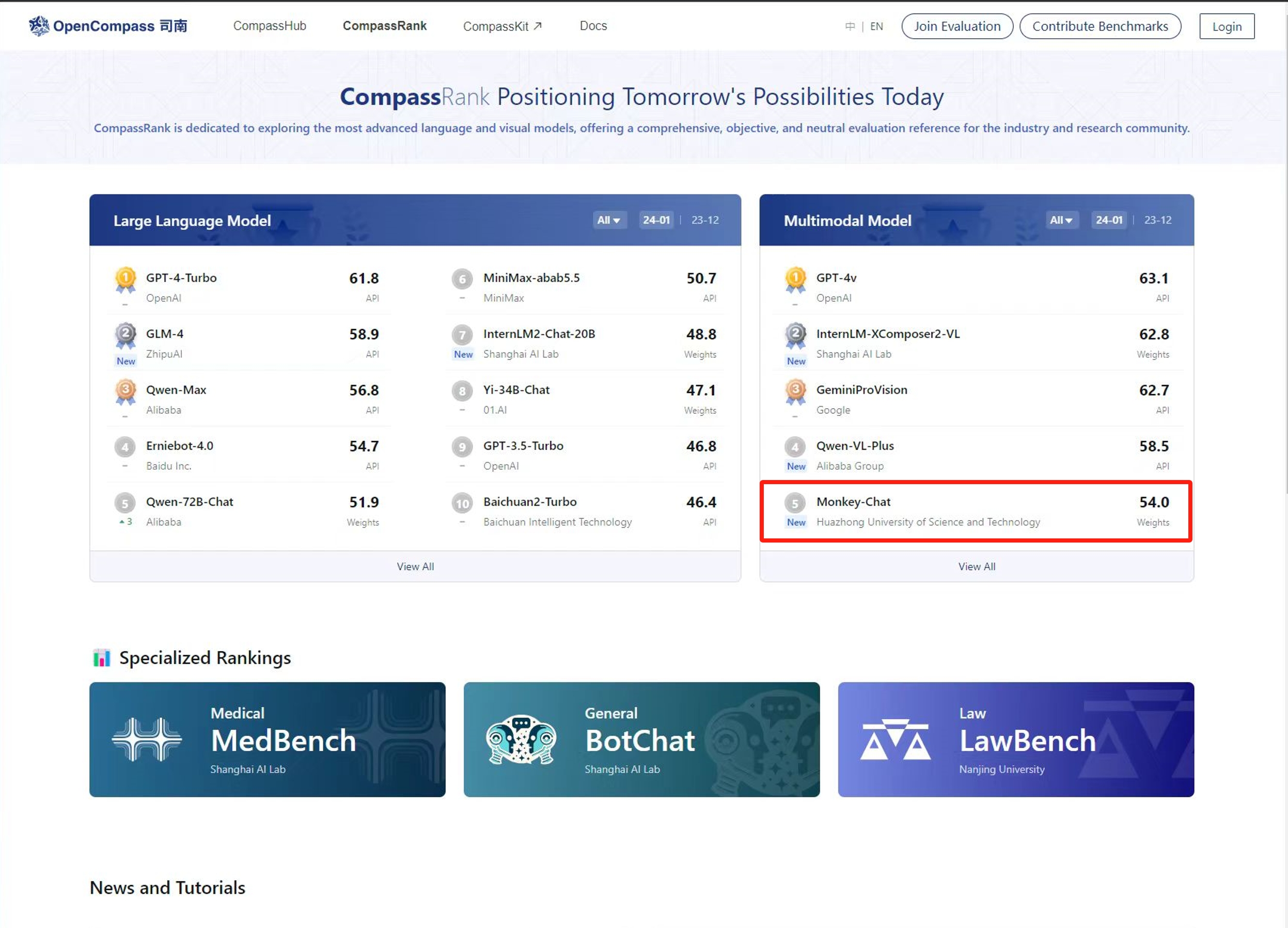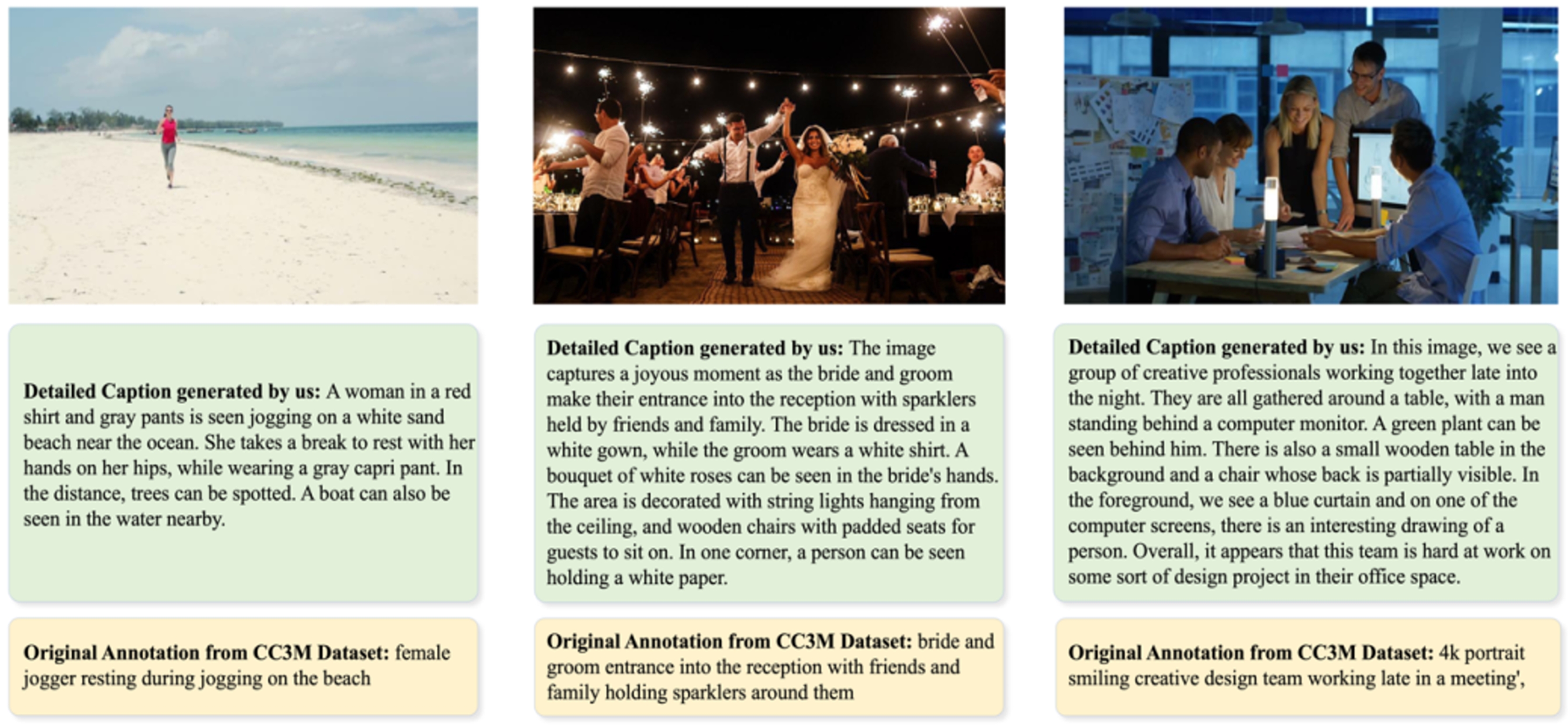

>[CVPR'24] [**Monkey: Image Resolution and Text Label Are Important Things for Large Multi-modal Models**](https://arxiv.org/abs/2311.06607)
> Zhang Li, Biao Yang, Qiang Liu, Zhiyin Ma, Shuo Zhang, Jingxu Yang, Yabo Sun, Yuliang Liu, Xiang Bai
[](README.md)
[](README.md)
[](http://vlrlab-monkey.xyz:7681/)
[](http://huggingface.co/datasets/echo840/Detailed_Caption)
[](http://huggingface.co/echo840/Monkey)
[](https://www.wisemodel.cn/models/HUST-VLRLab/Monkey/)
[](https://wisemodel.cn/space/gradio/huakeMonkey)
> [**TextMonkey: An OCR-Free Large Multimodal Model for Understanding Document**](https://arxiv.org/abs/2403.04473)
> Yuliang Liu, Biao Yang, Qiang Liu, Zhang Li, Zhiyin Ma, Shuo Zhang, Xiang Bai
[](https://arxiv.org/abs/2403.04473)
[](monkey_model/text_monkey/README.md)
[](https://huggingface.co/datasets/MelosY/TextMonkey_Data/tree/main)
[](https://www.modelscope.cn/models/lvskiller/TextMonkey)
## News
* ```2024.4.13 ``` 🚀 Sourced code for [TextMonkey](monkey_model/text_monkey/README.md) is released.
* ```2024.4.5 ``` 🚀 Monkey is nominated as CVPR 2024 Highlight paper.
* ```2024.3.8 ``` 🚀 We release the paper [TextMonkey](https://arxiv.org/abs/2403.04473).
* ```2024.2.27 ``` 🚀 Monkey is accepted by CVPR 2024.
* ```2024.1.3 ``` 🚀 Release the basic data generation pipeline. [Data Generation](./data_generation)
* ```2023.12.16``` 🚀 Monkey can be trained using 8 NVIDIA 3090 GPUs. See subsection [train](#Train) for details.
* ```2023.11.06``` 🚀 We release the paper [Monkey](https://arxiv.org/abs/2311.06607).
## 🐳 Model Zoo
Monkey-Chat
| Model|Language Model|Transformers(HF) |MMBench-Test|CCBench|MME|SeedBench_IMG|MathVista-MiniTest|HallusionBench-Avg|AI2D Test|OCRBench|
|---------------|---------|-----------------------------------------|---|---|---|---|---|---|---|---|
|Monkey-Chat|Qwev-7B|[🤗echo840/Monkey-Chat](https://huggingface.co/echo840/Monkey-Chat)|72.4|48|1887.4|68.9|34.8|39.3|68.5|534|
## Environment
```python
conda create -n monkey python=3.9
conda activate monkey
git clone https://github.com/Yuliang-Liu/Monkey.git
cd ./Monkey
pip install -r requirements.txt
```
You can download the corresponding version of flash_attention from https://github.com/Dao-AILab/flash-attention/releases/ and use the following code to install:
```python
pip install flash_attn-2.3.5+cu117torch2.0cxx11abiFALSE-cp39-cp39-linux_x86_64.whl --no-build-isolation
```
## Train
We also offer Monkey's model definition and training code, which you can explore above. You can execute the training code through executing `finetune_ds_debug.sh` for Monkey and `finetune_textmonkey.sh` for TextMonkey.
The json file used for Monkey training can be downloaded at [Link](https://drive.google.com/file/d/18z_uQTe8Jq61V5rgHtxOt85uKBodbvw1/view?usp=sharing).
## Inference
Run the inference code for Monkey and Monkey-Chat:
```
python ./inference.py --model_path MODEL_PATH --image_path IMAGE_PATH --question "YOUR_QUESTION"
```
## Demo
Demo is fast and easy to use. Simply uploading an image from your desktop or phone, or capture one directly.
[Demo_chat](http://vlrlab-monkey.xyz:7681) is also launched as an upgraded version of the original demo to deliver an enhanced interactive experience.
We also provide the source code and the model weight for the original demo, allowing you to customize certain parameters for a more unique experience. The specific operations are as follows:
1. Make sure you have configured the [environment](#environment).
2. You can choose to use the demo offline or online:
- **Offline:**
- Download the [Model Weight](http://huggingface.co/echo840/Monkey).
- Modify `DEFAULT_CKPT_PATH="pathto/Monkey"` in the `demo.py` file to your model weight path.
- Run the demo using the following command:
```
python demo.py
```
- **Online:**
- Run the demo and download model weights online with the following command:
```
python demo.py -c echo840/Monkey
```
For TextMonkey you can download the model weight from [Model Weight](https://www.modelscope.cn/models/lvskiller/TextMonkey) and run the demo code:
``` python
python demo_textmonkey.py -c model_path
```
Before 14/11/2023, we have observed that for some random pictures Monkey can achieve more accurate results than GPT4V.

Before 31/1/2024, Monkey-chat achieved the fifth rank in the Multimodal Model category on [OpenCompass](https://opencompass.org.cn/home).

## Dataset
You can download the training and testing data used by monkey from [Monkey_Data](https://huggingface.co/datasets/echo840/Monkey_Data).
The json file used for Monkey training can be downloaded at [Link](https://drive.google.com/file/d/18z_uQTe8Jq61V5rgHtxOt85uKBodbvw1/view?usp=sharing).
The data from our multi-level description generation method is now open-sourced and available for download at [Link](https://huggingface.co/datasets/echo840/Detailed_Caption). We already upload the images used in multi-level description. Examples:

You can download train images of Monkey from [Train](https://pan.baidu.com/s/1svSjXTxWpI-3boALgSeLlw). Extraction code: 4hdh
You can download test images and jsonls of Monkey from [Test](https://pan.baidu.com/s/1ABrQKeE9QBeKvtGzXfM8Eg). Extraction code: 5h71
The images are from CC3M, COCO Caption, TextCaps, VQAV2, OKVQA, GQA, ScienceQA, VizWiz, TextVQA, OCRVQA, ESTVQA, STVQA, AI2D and DUE_Benchmark. When using the data, it is necessary to comply with the protocols of the original dataset.
## Evaluate
We offer evaluation code for 14 Visual Question Answering (VQA) datasets in the `evaluate_vqa.py` file, facilitating a quick verification of results. The specific operations are as follows:
1. Make sure you have configured the [environment](#environment).
2. Modify `sys.path.append("pathto/Monkey")` to the project path.
3. Prepare the datasets required for evaluation.
4. Run the evaluation code.
Take ESTVQA as an example:
- Prepare data according to the following directory structure:
```
├── data
| ├── estvqa
| ├── test_image
| ├── {image_path0}
| ├── {image_path1}
| ·
| ·
| ├── estvqa.jsonl
```
- Example of the format of each line of the annotated `.jsonl` file:
```
{"image": "data/estvqa/test_image/011364.jpg", "question": "What is this store?", "answer": "pizzeria", "question_id": 0}
```
- Modify the dictionary `ds_collections`:
```
ds_collections = {
'estvqa_test': {
'test': 'data/estvqa/estvqa.jsonl',
'metric': 'anls',
'max_new_tokens': 100,
},
...
}
```
- Run the following command:
```
bash eval/eval.sh 'EVAL_PTH' 'SAVE_NAME'
```
## Citing Monkey
If you wish to refer to the baseline results published here, please use the following BibTeX entries:
```BibTeX
@inproceedings{li2023monkey,
title={Monkey: Image Resolution and Text Label Are Important Things for Large Multi-modal Models},
author={Li, Zhang and Yang, Biao and Liu, Qiang and Ma, Zhiyin and Zhang, Shuo and Yang, Jingxu and Sun, Yabo and Liu, Yuliang and Bai, Xiang},
booktitle={proceedings of the IEEE/CVF conference on computer vision and pattern recognition},
year={2024}
}
@article{liu2024textmonkey,
title={TextMonkey: An OCR-Free Large Multimodal Model for Understanding Document},
author={Liu, Yuliang and Yang, Biao and Liu, Qiang and Li, Zhang and Ma, Zhiyin and Zhang, Shuo and Bai, Xiang},
journal={arXiv preprint arXiv:2403.04473},
year={2024}
}
```
## Acknowledgement
[Qwen-VL](https://github.com/QwenLM/Qwen-VL.git), [LLAMA](https://github.com/meta-llama/llama), [LLaVA](https://github.com/haotian-liu/LLaVA), [OpenCompass](https://github.com/open-compass/opencompass), [InternLM](https://github.com/InternLM/InternLM).
## Copyright
We welcome suggestions to help us improve the Monkey. For any query, please contact Dr. Yuliang Liu: ylliu@hust.edu.cn. If you find something interesting, please also feel free to share with us through email or open an issue. Thanks!